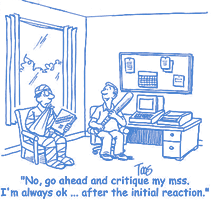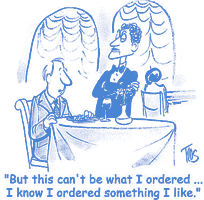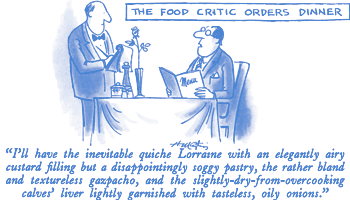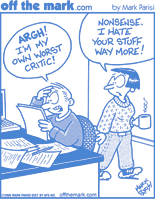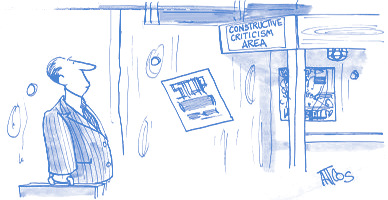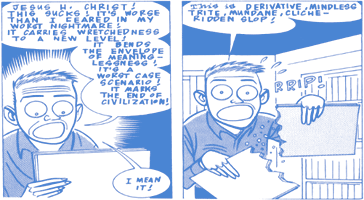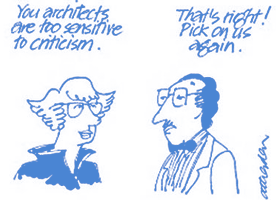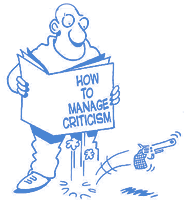

|
 Paul Arden Paul Arden
The 5th key to learning. What is key in learning? This is the fifth of a number of keys that are meant to bring understanding about what learning is and how leaning can be improved by understanding the message of those keys. This key is about the necessity of criticism in learning. This key is about keeping our minds open to the views of others and so learn; it is about how to change other's views so they can learn; and it is about how to avoid feeling bad when criticized so you can learn.
"Ask for a slap in the face." Paul Arden "You may not realize it when it happens, but a kick in the teeth may be the best thing in the world for you." Walt Disney "Think not those faithful who praise all thy words and actions, but those who kindly reprove thy faults." Socrates "A wise skepticism is the first attribute of a good critic." James Russell Lowell Be prepared to be criticized. In the pursuit of knowledge nothing is certain. We must be prepared to revise what we know again and again. Overcoming the fear of criticism and learning how to benefit from and take heed of criticism, is the second most crucial step for effective learning. We must come to enjoy criticism and revision, as part of a more accurate and complete understanding, enabling us to truly learn efficiently. It is a sad fact, that in most people, there is some confusion between the ideas that we hold (our theories and conjectures) and our sense of self. If someone attacks our ideas, we tend to experience and view it as an attack on our self. Not only that, but in presenting our ideas, we often do it in such a way as to make it clear, that any criticism of those ideas will be taken as an attack on ourselves. In this way, criticism is often precluded before it can even begin. In this way we may never hear criticism as our critics are normally too afraid to speak. "Honest criticism is hard to take, especially from a relative, a friend, an acquaintance, or a stranger." Franklin P. Jones "To avoid criticism do nothing say nothing be nothing." Elbert Hubbard  
Criticism is a much maligned activity, but unfortunately is so, for very good reasons. The fact is that criticism, as it is used by most people, is hostile and unconstructive. Thus it causes people to be defensive. Indeed our hackles seem to rise at the very mention of the word critic. Of course, we are most familiar with critics of the arts (painting, sculpture, theatre and movie critics). These critics are seldom constructive, and are often scathing and vitriolic. They fit the image of being pompous, writing and speaking as if they know better than the artist, as to the merits of the artistic work. This is so negative that there is an old saying: "Those that cannot do, teach, and those who cannot teach, criticize." Is it any wonder then that people get the wrong idea about criticism? In their book "The Artist's Way at Work" Bryan, Cameron and Allen spell this out: "Unfair criticism is indirect, unprincipled, and ambiguous; personal, negative and derogatory. Any criticism that attacks us as people rather than addresses us as potentially competent is toxic criticism. Toxic criticism creates toxic work environments - negative, backbiting, and backsliding - where honesty becomes harder and harder to come by. Expecting that confronting problems will only bring us pain and debasement, we defend rather than listen, lie rather than explore, deny rather than experience the situation. Eventually, our anger at ourselves for being inauthentic festers until we strike out in defiance or succumb to burnout. This dynamic can happen at any level in a company. Defiance creates resistance, and resistance to criticism creates stalemates. Stalemates create stagnation, which creates depression, which breeds despair. A despairing work environment is truly abysmal; counterproductive, anticreative and all too common." People do not want to be wrong, so they tend to avoid the very process that will enable them to eventually be right. Thus we tend to avoid criticism. Not only do we do this, but we also tend to shy away from all forms of refutation, and instead seem to seek to confirm. It is more comfortable for the brain to seek confirmation of its theories and conjectures than is is to seek disproval of them. Unfortunately this tends to polarize the things that we know into black and white categories or cause them to be extreme. We should instead embrace the principle of accepting criticism. The Need. Clearly we should be self critical, and like the best scientists never overlook the anomalies and not shy away from refuting the things that we believe. But humans usually do not. Seeing that we are unable to do this, we should then, be prepared to be criticized by others using this scientific method. Alas we remain unprepared. This all goes back to our most primitive need, the need to find certainties in the world and thus in knowledge. It may well be that early inability to make sense of the world may have led the unwary into error. It is our lack of confidence in a consistent world that causes various groups to cling to what they believe. This causes people to try and prove, rather than disprove, to believe rather than disbelieve, to seek certainty rather than be skeptical. Many sorts of criticism. There are many sorts of criticism and this site will attempt place a critical eye on all of them. Unless we make a conscious effort to be aware of the types of criticism we are giving or receiving, we will not have a clue about the type of criticism or its function. Even if we do make the effort, we are faced with an enormously difficult task, because criticism is never a pure type and comes out all mixed up together. People use mixtures of all four of the types of criticism mentioned below, all mixed up together all the time. Not only that, but people are most often unaware of their objectives in giving the criticism, and thus have no clue as to which types of criticism they are giving or getting. There are no little signs that pop up during the criticism to clue us in, but a little knowledge can help guide us. Four types of criticism. First let us look at the four important categorical functions. Criticism performs four very different functions in human relations and social intercourse, and three of those functions are toxic. The four functions are as follows:
This is criticism that is meant to hurtful to the person being criticized. We use this sort of criticism we we want to hurt someone, usually when we are angry or if we hold a grudge. This is criticism that is meant to control the person being criticized. We use it when we want to get somebody to do something that we want done. This kind of criticism rarely achieves it's objective of getting that something done. But even when it seems to be successful, the result is the very minimum, for it it is done grudgingly. This is criticism that is meant to diminish the person being criticized so that the criticizer can feel superior. This is the criticism that is meant to facilitate the person being criticized, so that person is improved in the act of learning. 1. Criticism that hurts. We usually know when people do not like us or are holding a grudge against us. When being criticized by such people we should expect some criticism that means to intentionally hurt us. Likewise, we will tend to find this kind of toxicity in our own criticism, if we dislike or hold a grudge against some person we are criticizing. When we are angry we will tend to use criticism that is meant to hurt. Anger is a strong emotion that tends to override other considerations and we are all subject to it. Sometimes the criticism we receive is not really aimed at us at all, and the criticizer is angry with somebody else. In a moment of anger caused by somebody else we too can give out hurtful criticism. In any case, it is always a good idea to avoid giving or receiving criticism when anyone is angry. 2. Criticism that controls. There is a fatal flaw in human beings that goes back to our early need for certainty in how the universe works. We want to control the world and the most straightforward easiest way of doing this with people often seems to be coercive and kick-start the person. This does not work well on the universe and only seems to work well on people. Controlling criticism tends to build resistance and resentment on the one hand and compliance and lack of initiative on the other. This destructive criticism tends to end in pain for the criticizer and the criticized. The tendency of people to use this kind of criticism is often directly related to the strength of the entity self-theory or fixed mindset that they hold. 3. Criticism that diminishes. The desire to diminish others so that you can feel superior is also almost always caused by the person criticizing holding an entity self-theory or a fixed mindset. How much you tend to use this kind of criticism will largely depend on where your self-theory falls on the entity incremental continuum. This one-upmanship also has dire consequences for both the criticizer and the criticized. 4. Criticism that facilitates learning. This type of criticism actually performs two different although similar functions. Firstly, this kind of criticism is a major factor in how the body of knowledge which is held in common for all humanity, that is Popper's world 3, is changed, improved and is nurtured to grow. Secondly, this kind of criticism is used to try to change people, hopefully for the better. This kind of criticism is of course, although well intentioned, not always correct. The thing is not to accept any criticism as necessarily correct, but to be open to the possibility that you might be wrong. It is essential for the functioning of world 3 knowledge, and is normally helpful in promoting the mental growth of ordinary human beings. This was explored in the dialogues of Plato as well as the writings of the other most important philosophers, where each person listens to the logic of what the other is saying without fearing any threats to the self. Clearly to do this we must be confident not only in our ability to be right, but also to feel safe in our ability to be wrong. In life one thing is sure. No matter what we do, we will inevitably be criticized for doing it. The more lives we affect, the more we become a target for people's criticism of what we have done. But this criticism is mostly a good thing, as it enables what we have done to be reversed, sharpened or improved. This applies especially to the written word. The function of criticism in learning. Criticism serves two purposes in learning.
It functions as a service provided by the criticizer to enable the recipient to improve his/her work. Or it functions as a service provided to the recipient by the criticizer to enable them to improve themselves by improving their actions. Our best friend. Somehow, some way we need to make friends with criticism. Criticism can be our best friend. In fact our best friend should be our most severe critic. Who else can expose our flaws and foibles if not our best friend? Critics are not, and should not be, special people. Everyone can and should criticize anything and everything. The important thing is not to be hostile in criticism but to be constructive and helpful for the purpose of improving others, their work and the world in general. The Critic. The function of a critics should be to help improve and refine our work. They should expose our weaknesses, but not lambaste or lampoon them. They should show how others might have proceeded, but not make derogatory comparisons. They should show how what we are doing might be improved, but not try to dismiss or crush what we are doing. "Criticism should not be querulous and wasting, all knife and root-puller, but guiding, instructive, inspiring." Ralph Waldo Emerson "What we ask of him [the critic] is, that he should find out for us more than we can find out for ourselves. He must have the passion of a lover." Arthur Symons "Neither praise or blame is the object of true criticism. Justly to discriminate, firmly to establish, wisely to prescribe, and honestly to award. These are the true aims and duties of criticism." William Gilmore Simms Questions. Constructive criticism is the life blood of learning. It is all about the questioning of the new and of what is currently held to be true. Questions in turn are always being critical of something that is held to be or proposed to be true. The answers are not enough, the questions are more important. It is the desire to know, not the knowing, that is the divine spark. As Popper has said, we can never know that we have found the final truth. Knowledge is theory not objective reality. Constructive criticism (questions) is how we are able to improve those theories and how we refine knowledge. It is how we get closer and closer to the truth or an accurate model of objective reality. Questions serve two purposes. They pick up flaws in what is proposed so that it can be improved or replaced. Also they are the way in which we begin to understand that there is a problem so that we can formulate that problem.
"The formulation of a problem is far more often essential than its solution." Albert Einstein "Judge a person by their questions, rather than their answers." Voltaire "When you stop learning, stop listening, stop looking and asking questions, always new questions, then it is time to die." Lillian Smith "The scientist is not a person who gives the right answers, he is one who asks the right questions." Claude Levi-Strauss "There are no foolish questions, and no man becomes a fool until he has stopped asking questions." Charles P. Steinmetz The critic must expect criticism. It is, of course, easy to be critical when no one can criticize your criticism, even if that criticism is constructive. Criticism is or should be a dialogue. It invites further criticism of itself, as this is the way in which it finds balance, so it can be used to refine ideas. Three Mental Categories. The problem is in the inability of people to listen carefully and impartially to criticism of their own ideas, or adopted ideas they adhere to. To begin to accept and benefit from criticism we can make it easier by consciously dividing up our theories into 3 categories by which we can set different standards of personal involvement towards criticism. The categories are: Those notions that make up the self and define the boundaries of the self. (We will protect these at all cost unless we can logically be convinced we are crazy). Those ideas which we really feel are worth defending. (We will listen to criticism of such ideas and oppose that criticism, but be prepared to change such ideas if we can be personally convinced). Those theories which are not essential to us in any way. (We will be totally be open to criticism of these and feel no need to defend them unless we perceive the logic of the criticism to be flawed. We shall be prepared to change and improve these theories fairly easily).
How to listen to criticism, especially toxic criticism and learn from it. It is essential to learn how to listen to criticism and very hard to do it well. At first, few people are good at it. People do not become good at it until they they reach the kind of self confidence in learning that is so evident in self-actualized people. Be that as it may, the following should be helpful if you make an effort to follow these instructions taken mostly from "The Artist's Way at Work" by Bryan, Cameron and Allen:
Do not interrupt or defend, just listen. This is a very hard thing to do, but when it can be done, it is extremely effective in opening learning possibilities. It is difficult, because in our society we have associated the experience of criticism with pain. We are hurting and we do not want to listen further. The tendency is to lash out and defend ourselves. It is best to try and refrain from doing this. Just wait. In the society we live, most criticism is neither all toxic nor all constructive. Even the most toxic criticism will have small gems that are helpful and accurate. Likewise constructive criticism will often have little hurtful asides, that are not helpful nor accurate. Once we have heard the criticism, we need to weigh it against our sense of truth and sort out what is toxic and what is helpful. You see all these funny things in the movies and surprisingly they all work. Someone may count up to ten or go out and water the lawn or go for a long walk to cool down. What they are doing is allowing the emotion of hurt to well up inside them and then gradually subside. They are allowing anger to cool. This is a way of deferring the human response till one can think rationally again. After criticism, when a person has reverted to state where sensible analysis is possible, it is probably best to write down exactly what the critic has pointed out. If you do this, it will better enable you to see exactly what was said and meant. In this way, what was recommended will not be distorted by faulty memory. When you have completed this accurate record of the criticism, you can begin to marshal arguments for or against it. Refrain from being toxically critical of the criticism. Practice being constructive and accurate in your analysis of the criticism. Be systematically logical and consistent. Be a good critic. You have written two documents. When you have finished writing both documents, you should take them both to someone you trust and ask them to read through and give their opinion. By trust, we mean someone who's judgment you go by, not someone you trust to support you and your actions no matter what. Remember the whole idea of criticism is to improve your inner self and your work, thus enabling you to learn from this experience. When this trusted person gives his judgment, again you should listen and not defend or even speak. Even though you trust this person, anything negative you hear will sting. Again, although you will want to defend yourself. Try to refrain from doing this. Now you can weigh your friend's judgment and marshal what you might want to say in return to the original person's criticism. Be careful to only defend what was sensible in your original actions, accepting the criticism that was constructive and accurate. It is not such a bad idea to record all this before you say anything. Now you know where you were wrong, so you have to plan how to take affirmative action as to how to set things right. A good scheme is to actually write down what you need to do. Set this down in a series of steps. What to do first, then what to do next and so on. Now with all the information needed, it should be apparent what you did wrong and how to fix it. You even know the order in which you are going to do it. Ideally you have truly learned from the criticism, enabling you to fix what was wrong. All that remains is to do it. How to get people to be constructive in their criticism. If we truly want other people to be constructively critical of us, our actions and our work, what methods can we implement to stop them being destructively critical and switch to being constructive? There are three answers to this.
We can control the context in which the criticism occurs. For instance one would hope that among a group of peers such as a scientific forum people would tend to be more constructive in their criticism. And for instance a marriage counselor by using his position can control a couple's criticism of each other, directing their criticism to become constructive so reuniting a husband and wife at odds. Every person who criticizes wants to be heard. The only way they can know that that they have been heard is if the person being criticized says something back to them to let the know that they have been heard. If people feel they are not being heard they may begin to shout, become abusive and angry and essentially forestall any chance of the critic becoming more constructive in their criticism. Part of helping critics to be more constructive in their criticism is to genuinely listen to the criticism and try to understand it. If you are able to really listen you can then make use of what you have heard to defuse the situation. This can be done by reflecting back to the person the criticism that they have just given you. The most effective way to do this is to repeat back the criticism, rephrased in your own words. This is what Thomas Gordon calls active listening. If you can use this rephrasing often when being criticized you will find that not only will it have a calming effect on the critic, but it will also induce a willingness in the critic to listen to what you might have to say in return. Asking for criticism is paradoxically perhaps the most effective way we can deflect others from being toxic in their criticism of us. Weisinger in his book "The Power of Positive Criticism" suggests that in asking for criticism it is perhaps not a good idea to use the word 'criticism'. Other's negative perception of the word 'criticism' will cause them to concentrate unnecessarily and exclusively on what you are doing wrong. Or they may view your request as being sarcastic. Instead he suggests that we ask them for their thoughts on how you can be more effective. We also might ask, "What is wrong with this?" Or alternatively we could enquire, "What can I do to make amends for this?" If we ask our friends and colleagues for constructive criticism, such people are obligated to be helpful. Thus they will try to be constructively critical. They will be less guarded and worried about hurting our feelings. If we ask our opponents and competitors for criticism, they may suddenly see that we are serious in wanting to improve or make amends, and may even change to wanting to be constructive in their criticism. They will see we are actually listening to what they say, and that if they are convincing, they have an opportunity to change strategy and perhaps convert us to their view. Manuel J. Smith wrote a book about self assertion called "When I Say No I Feel Guilty". In this book he recommends people to use a technique called 'negative inquiry' to protect themselves from criticism, thus enabling them to handle it. A person can start off name calling and generally being unconstructively critical. However in response to negative inquiry, they can change to become constructively critical. Negative inquiry is simply asking for more information about the criticism. For instance, if someone tells you they don't like your work, ask them to be specific, "What is it about the work that you do not like?" Or you can ask them why, "Why don't you like this aspect of the work?" To get them to be constructively critical, you must ask them for suggestions that could help you fix the problems as they see them. "How do you think I could improve the work?" After just a few of these sorts of questions a person who has been toxically critical will automatically be transformed into someone who is constructively critical. Thus changing them from being hostile and defensive into being helpful and interested. Become unafraid and open to criticism. Asking for criticism and negative inquiry, perhaps not unexpectedly, will also make you yourself more open to listen to the criticism. By actually listening to constructive criticism, it is possible to learn something and generate improvements to ideas. Beware of sarcasm. Do not seek constructive criticism or use negative inquiry if all you want is praise. If you do, you will find that it will be interpreted as sarcasm. Anything put out in a sarcastic manner creates enmity. This may lead to your being punched in the nose, have other violence done to you or at least instigate lasting enemies. Asking for criticism can only be done out of a genuine need to improve and an interest in what others think. Getting praise or approval is easy if we ask enough people, or if we ask those who are likely to tell us what we want to hear, but it shouldn't be sought after. Usually without being asked, people will say nice things rather than be too critical. "People who ask for your criticism want only praise." W. Somerset Maugham (This is not always true, but is true often enough to be a frequent source of trouble in the world.) Preparing to be constructively critical. It is essential to prepare and use diplomacy when considering being critical of others. This is not an easy thing to do well but here are some recommendations from The book "Criticism Management" by Randy Gardner.
Often we are hardly aware that we have ulterior motives in criticizing, remembering that the aim of criticism should be to help the other person. Putting them in their place, or getting back at them, is not going to help them. Incidentally it might not be of much benefit to you either. If the underlying motive is solely some kind of ego assault, it would probably be more productive to take a deep breath, let emotions subside so that critical content can be constructive. Nothing could be worse than offering criticism that is unwarranted, undeserved, or based on faulty information. Be sure to gather all the relevant information you need. Get the facts straight. It is also a good idea to be aware of any examples of similar problems or circumstances that have previously occurred. This is not to demolish your target but to be ready to indicate a pattern if the item in question is disputed. Behaviorists will tell you that immediate criticism will be more effective. However, picking a good time and place will be much more effective in producing a positive response. Pick a time when neither you nor the recipient is likely to be tired and irritable or emotional. Early in the day is probably better than later. It is also usually best to conduct your criticism in private. Criticism in front of others is inevitably seen as an attack on self-esteem. Also try to find a place devoid of noise and other distractions. If you are upset, your criticism will inevitably be harsh and demeaning whether you intend it to be or not. This will also contaminate the state of mind of the recipient, making it more difficult to be effective. So you must try to moderate your emotional state and any triggers that might be set off. You should also try to gauge your audience's emotions. Be sensitive and empathic and as a general rule avoid being critical when emotions are running high. You must be prepared to change tactics if the approach you are using is being read as an ego attack. The time and the place may also be conceived as contributing to the perception of an attack. If so be prepared to change them. It might be worth rehearsing some positive things to say, aware that all people need to be reassured of their worth and value. Such is more likely to open the person to acceptance of your criticism. When you criticize you are always using some yardstick to evaluate other's action or work. It is essential to good criticism that the targets are familiar with this yardstick. If they are not, you are obligated to outline such standards. Obviously you yourself must stick rigidly and consistently to these standards and not loose sight of its objectives. You should not only rehearse what you are going to say in your head, but try also to construct imaginary scenarios of what the other might say and of how the situation might develop. In this way, you can build up and rehearse how whole critical conversations might go beforehand. In dealing with people one should contrive many dialogue role plays ready for use. From such a position you can vary these dialogues by changing how the other person might respond to various points. Thus you can build up and play out a number of different scenarios that might happen. Be advised, not to only consider possible negative reactions to the criticism. Be ready for positive reactions also. What are you going to say after the person says, "You're right. I should have handled that differently?" Doing this should also helps you to be more open to the other person's views. Even though you have an idea how the criticism encounter is going to proceed, unless you have had prior experience along these lines you should probably organize your thoughts by writing down points of the main sequence of events you hope to discuss. Some people might even like to prepare cards with notes on them similar to giving a speech. This can be especially useful the first few times you try it. Even if you have to refer to these cards, it will create the impression that you are organized and have carefully considered your comments and presents your criticism as a serious art. With criticism you cannot really win if the other person loses. Oh you can win an argument that way but this is hardly a benefit. With criticism you only really benefit if the other person benefits. You only win if the other person wins. Truly constructive criticism is a function of synergy which flows both ways. Mixing criticism with praise. When you criticize it is a kind of evaluative feedback. You are essentially trying to express what the person (in your opinion) did wrong (criticism). But any informational feedback of this sort should also include feedback about what (in your opinion) the person did right (praise). Keep in mind that praise of the person or even his work or actions has been found to be counter productive by Carol Dweck and her colleagues. The best kind of praise is that of effort, perseverance and strategies. But why mix praise and criticism at all? Because mixing praise and criticism provides many advantages in facilitating learning if performed in an effective manner. In his book "The Power of Positive Criticism" Hendrie Weisinger has a lot to say about how criticism and praise should be mixed as follows: "You may be one of those who believes that including some positives when you criticize is a simple way to soften the blow. To some extent you are right. But there are several more important benefits of including the merits that help make criticism productive. One is that it brings into awareness what the person is doing right, something we often forget when we are angry or disappointed and giving a barrage of criticism. Being aware of a person's merits, whether you express them or not, allows you to perceive the person in a more positive manner. This keeps anger and disappointment in check. When you explicitly state the positives, it conveys that you are aware of and appreciate his efforts. The recipient's self-esteem is intact, if not enhanced. A few specifics about the nature of your positives. First, your positives must be sincere. Giving a soft-soap job is likely to make matters worse - if you can't come up with any positives, don't invent them. Also, it's essential that the positives you are mentioning are important to the recipient. You may think that telling your secretary her letters are typed neatly is a positive, but this may be something she takes for granted. For her a positive may be , 'I liked the way you worked that last line and gave it a personal touch.'" How to give constructive criticism. It is essential to learn how to be constructively critical to be able to yourself learn from criticism. If you are toxically critical of others, how can you expect others to be constructively critical with you. Here are some recommendations mostly from The book "Criticism Management" by Randy Gardner but also some thoughts on criticism found in Carol Dweck's work as presented in her book "self-theories" and some from the book "The Power of Positive Criticism" Hendrie Weisinger.
Clearly you should not begin to criticize if you are angry or distressed. You should rather wait until you have calmed down. Even so you should try to remain an aloof observer to your emotional state when you start to criticize, as the very act of criticizing can be emotionally and psychologically taxing. Furthermore, you will need to remain calm in the face of reactions from the person you are criticizing. With this in mind you will find it helpful to focus intently on keeping a calm steady tone and demeanor. The best antidote for increased emotionality is to continually be aware that you are, or should be, providing beneficial information, the purpose of which is to help the person you are criticizing. To keep a lid on tensions, you might consider pausing in your criticism or interrupt the dialogue. You can excuse yourself for a moment to find something. This should enable you to compose yourself before continuing. Criticize the act not the actor; the performance not the performer. Never be critical of the person. If you are personally critical, you are fostering a condition of learned helplessness, which is the very opposite of what you should want to do. What you should want to do is facilitate learning. Telling a person they are stupid, unintelligent or talentless and incompetent is not only demotivating, it is also creating a mindset that it is safer not to try. After all if the person does not try, and if the work is incompetent, it only reflects the lack of trying and not that the person is incompetent. You can be critical of what the person has done i.e. their actions or their work or skills. When our work is criticized constructively, we instinctively recognize that the other person is trying to find flaws in our work so we can correct them, and make improvements. People generally receive accurate and constructive criticism with openness. Even if the criticism is pointed and harsh, we can accept it as a healing scalpel that is cutting away the dead wood and disease of our flawed actions. When we hear accurate criticism, we are relieved, because we realize that it will redirect us to do better. This is so, because nearly all people want to accomplish a great job. They want to do the best job they are capable of, and if that means getting a little criticism, that is a small and necessary price to pay. Remember the idea is not to inflate yourself at the other's expense, but to help them improve, grow, excel or recover. Teresa Amabile's research has shown that the more information provided in criticism the more creative the one criticized will become. The research performed by Deci, Ryan and others has shown that the more information provided in criticism the more those criticized become intrinsically motivated. So, not only does the amount and quality of informative content in criticism tend to overcome our fear of criticism, but also it increases our intrinsic motivation, and it increases creativity. However, telling people what they did wrong will not help them much without an indication of how to do it right. Learning that we did something aesthetically impoverished or not up to standard does not, in itself, help us to make it presentable or better. What we need is, positive feedback that at the very least gives clues as to how to do it correctly and achieve artistic sensibility. Good critical direction should assist the person towards fixing future problems. The problems of the past have already occurred; the goal is to use the past mistakes and difficulties as tools to prevent similar occurrences in the future. The future is about what can be done (instead of what was done) of how to do it better. Even so there are other special types of criticism, which when used in conjunction with the above, which will improve constructive criticism by giving it a motivational impetus, making it productive. The research of Carol Dweck has uncovered that a great deal can be improved in a person's capacity to learn by a few very specific sorts of criticism. First and foremost among these types of criticism is criticism of effort. When you criticize effort you are not teaching others to be helpless the way calling them stupid or talentless does. Instead you are giving them a choice. Either they can go on not being able to do something or learn something, or they can apply greater effort and hard work and be able to do or learn those things. This is criticism the effect of which is to intrinsically motivate. The same is true when we criticize the persistence of others. When we tell people that they did not work at something long enough or persist in the face of failure, we again, are giving people a choice. If they want be able to do something or learn something they have to stick at it until they do. Also, this is true if you criticize the amount and variety of strategies the person used in trying to solve a problem or do something. Here again you are providing a choice. Either use more and better strategies so you will succeed or you can continue to fail. Yet another type of criticism, that this is true of, is criticism of the challenges the other person has faced. Here again you are providing a choice to either face more and better challenges or you can continue to be unable to do the things you wish or nor be able to learn or understand those things you might wish to. In his book "The Power of Positive Criticism" Hendrie Weisinger tells us how to effectively mix praise and criticism to produce to very effective learning. This should be considered only with the proviso that good praise should be about effort, persistence, strategies etc. Weisinger says: "The most common sequence is to begin by telling the person all the good things he is doing and then catalogue what is wrong. I have found this approach to be ineffective... State the positives - BUT - state what is wrong. ...When someone starts by giving you the positives of what you are doing, the typical reaction is to think, 'What did I do wrong? Here comes the ax.' You start to anticipate the negatives to come and begin to plan your rebuttal prematurely. And, lets not forget that the expectation that negative will soon come forth elicits negative emotions. Defensive behavior is brewing... One reason for this cognitive response pattern is that people are not used to getting positives in a work situation. When they do, these positives are usually followed by negatives... Now the other problem with this method of criticism: The word but is a negation. Semantically, it tells your recipient to forget about what she just heard - the positives. She then hears the negative part of the message... Let me give you an an alternative method of giving the merits so that they are heard and remembered. Instead of starting with the positives, start by focusing on how the person can improve; then conclude by telling the person what he is already doing well. State how the recipient can improve - AND - state the positive things... This capitalizes on three points. The first is that most people respond positively when you tell them to make something better. When you tell a person how he can do something better,...your recipient becomes more eager to hear your pointers. Second, this format takes advantage of the fact that people are much more likely to act productively on the criticisms they receive when they feel good. When you end your criticism on the upbeat, you are getting the recipient to experience positive affect, and this good-feeling state translates into motivational energy. The third point involves the word 'and.' ...It integrates the preceding statements. ...your recipient is much more likely to think, 'I am doing a lot of good things, and I can be that much better if I improve on some others.' ...it helps your recipient realize it's okay not to be perfect; she does some things well and can improve on others, and this is pretty good." Sometimes it is possible to be subtle in our criticizing, so that the recipient is hardly even aware that they are being criticized. This can be achieved by means of questioning. This technique, when it is convenient to use it, has obvious non threatening advantages. The person is likely to feel much less of a threat to his self esteem if he feels he has discovered a better way doing things on his own. In addition, questions as a form of communication, are a much less threatening to self esteem than accusations or even declarative statements. Remember, questions do two things. They not only necessitate information but also convey information. An example of the use of questions in this way, is the Socratic method, as this was the way Socrates used questioning to expose contradictions and inconsistencies. Be advised though, that questions can be used in an aggressive manner, causing people to look stupid or trip over their own ignorance. Still it is easier to use questions in a non aggressive way and this you should endeavor to do. Be precise and have specific details as to what is not working. If you are not completely sure of the facts, you should not be criticizing at all. Make sure you understand the problem, the evidence, and the yard stick against which you are measuring the behavior. Use words that are simple, precise and to the point. Do not use words that are obscure, or for that matter, use too many words. Excessive verbiage and unclear words can confuse and obscure an otherwise simple clear message. Don't require people to guess as to how they can improve but let them have some free rope. Know what it is that you expect, and convey this to the person you are criticizing. You can explain exactly how you would prefer them to do things better. Give examples of what could be done or better yet, give a demonstration of how to do it. If you criticize, you should always believe in that criticism one hundred percent. How often do people criticize because they think they are superior and criticism is part of their role. Others think they are expected to criticize or should criticize or are worried about what others will say if they don't. Being authentic means that you say what you really feel. Sometimes we are critical because the other person has caused us problems. Be aware it is only your problem not the person's problem. Be sure to use "I language"; I feel this; this affects me, etc. Being authentic means talking about how things are affecting you rather than them. If you are authentic, you cannot help but give good criticism, and only the most overly sensitive of people will not recognize your good intentions. Being authentic also prevents the bottling up of emotions that can cause you to lash out later. Even constructive criticism can be unfair. People often criticize before they fully understand what is going on. Being constructively critical means also being willing to listen to the person you are criticizing. You must try to understand the situation from their perspective. Even criticizing from a position of power may cause people to become defensive, and you must get past that. You need to keep in focus what is viable in what they are saying so that you can be fair. Remember criticism invites criticism of itself and this should be a two way dialogue. Do not use the 'I talk, you listen mode'. If you enforce a position of power to suppress this reactive criticism, you may miss important information that will help you better access the particulars of the situation. Furthermore, you may miss new information, that could impact and change your entire view of what you are criticizing. It is not only important to understand the person you are criticizing but it is often necessary to show that you appreciate their stance. The easiest way to do this is to repeat back to the person what they told you preferably using different words. Ambiguous criticism is of little help to anyone. Criticism requires that you get some feedback, verifying that the person being criticized clearly understands the meaning and implications. In order to find out whether they understand, listening to how they react is vital. If they have not understood the criticism, you need to present it in another way, and keep finding different ways to present the criticism till you are sure they have comprehended. To do this well, you need some way of eliciting feedback from the person being criticized. A word of caution; asking the person being criticized to repeat back what you have said is probably not a good way to elicit feedback. If you ask them to do this it will probably be taken negatively as condescending and anxiety provoking. You need to be more subtle more like asking that you compare notes or express your concerns that maybe you haven't been clear enough. There is yet another way of criticizing that people will find to be non threatening to their self esteem and that is to ask them for help. This can be especially helpful if you can do it well, particularly if you are attempting to criticize a person in a superior position of power or a person who is supposed to have superior knowledge. Such people usually feel they should be exempt from criticism from the likes of you. Criticizing by asking for help is very difficult to do well however, because if done badly, it sounds sarcastic. The only way to accomplish this well is to sound and be completely sincere. You can start off with something like, "I'd appreciate it if I could get your ideas on something that would really help me out..." If done well asking for assistance is positive and does not raise defensive shields. When asked for assistance people often are flattered or feel a sense of reciprocal obligation to be helpful. Chronic critics. There are some people who go through life just complaining about everything. It does not matter how well things are done, they will find something to criticize, usually in the most toxic manner possible. They do not know how to win friends and influence people. You may think there is no upside here and that you are not interested in helping this person. In fact you probably will not be able to change such a person. You can however, use their bad example as an opportunity to improve your skill at giving and receiving of criticism. Such averse circumstances can be used to hone your own skills in a shorter time. Where can you practice criticism? Of course, criticism is hotly practiced in the work place. However, schools, colleges, universities, debating clubs, symposiums, conventions, workshops and groups of any sort all use this critical method and are more important for learning, because they are where most knowledge (world 3) is revised and improved. While self criticism is possible, and often put to good use, it is not nearly as effective as the criticism from others, especially those working in similar fields and those of a like mind. The mutual criticism of scholars. Lets face it, people are generally lousy at giving and taking criticism. However in schools, colleges and universities it is the community of scholars that is so essential to learning, because of the mutual criticism that it engenders. Although people in learning communities, rant and rage, and cry and sulk, because they are often unable to give and take criticism in a constructive way, such communities are nevertheless essential. When the young bright minds of the world come together, exchanging and criticizing ideas, then learning of the most intensive and important sort takes place. This is the way in which our current knowledge grows and is refined. Just consider however, how efficient human learning might become, if just a few more people could learn how to be constructive and effective in their criticism. "The strength of criticism lies in the weakness of the thing criticized." Henry Wadsworth Longfellow Life long learning through criticism. As stated at the beginning of this page, criticism is the second most effective tool we can use in learning. By becoming better at giving and receiving criticism, we not only make learning and teaching more effective, but also more enjoyable. Making learning enjoyable for yourself and others means you and others will wish to do more of it. Ultimately the association of pleasure with learning leads to a life that is filled with learning. We become, as we should, life long learners. |
Needs Interest Method Reality Keys How to Help Creative Genius Future What is Wrong Theories Plus
How the World Works Confidence Fragile Interest Failure Teach to Learn Intellectual Contagion Starting Place
Making Choices Learn to Learn Learn the Future Evaluation
 All
is a Woven Web of Guesses.
All
is a Woven Web of Guesses.
